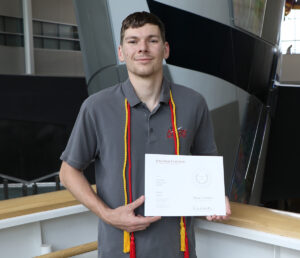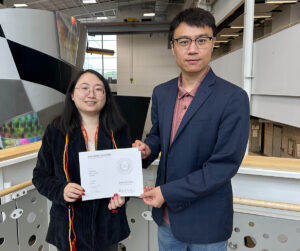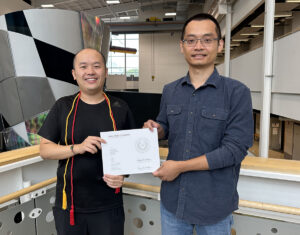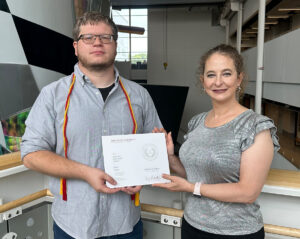Teaching and research recognition for aerospace engineering graduate students
Author: aere_sb1234
Author: aere_sb1234
Four graduate students from the Department of Aerospace Engineering have received the Teaching Excellence (TEX) and Research Excellence (REX) Awards from Iowa State University’s graduate college for spring semester 2024. These awards recognize graduate students who excel in scientific research or teaching performance.

Mason Henry and Liujing Wang are recipients of the TEX Award. Henry was nominated by Matthew E. Nelson, associate teaching professor and director of the department’s Make to Innovate program. Wang was nominated by associate professor Wenjie Xia.
Henry has been a teaching assistant in the department for multiple semesters. Nelson shared that in that role for Make to Innovate (AerE 2940 and 4940) Henry worked hard to improve fairness and rigor in grading students’ weekly reports. Henry also worked on improvements in the Howe 0620 lab space, which included helping to move and set up the new clean room that space-based projects will use in Make to Innovate.
Nelson said that among other contributions, Henry closely guided the HABET (High Altitude Balloon Experiments in Technology) team in preparing for the April 8, 2024 solar eclipse project, which saw the undergraduate student team using the balloon to analyze various atmospheric readings during the eclipse. Henry drew on his experience from the October 14, 2023 annular eclipse, which also saw activity with the HABET team, to mentor students effectively. He also played a crucial role in teaching best engineering practices for redesigning a float valve used in these projects. Nelson noted that his patience and wisdom are reflected in student feedback, highlighting his approachability, helpfulness, and sound advice.

Wang served as a teaching assistant for the Mechanics of Materials (EM 3240) course, contributing to multiple aspects of success, according to Xia. Recognized for her active engagement in student learning, Wang consistently clarified complex concepts, helped develop lecture notes and homework problems, and ensured that the course materials were comprehensive and well-prepared. “As a teaching assistant, Liujing has consistently demonstrated exceptional dedication, competence, and enthusiasm in supporting both the instructor and undergraduate students in their learning journey,” said Xia.
Wang has also been acknowledged for her versatility through quick thinking and problem-solving abilities. She handled technical issues with teaching equipment efficiently, ensuring smooth course delivery. “Overall, Liujing’s unwavering dedication, competence, and enthusiasm make her an exemplary teaching assistant who significantly enhances the learning experience for undergraduate students in EM 3240,” said Xia.
Lean Fang and Brian Kempa are recipients of the REX Award and were nominated by faculty members Ping He and Kristin-Yvonne Rozier, respectively.

Fang joined He’s research group in fall 2021 and holds a 4.0 GPA at ISU, having previously earned an M.S. from Lehigh University and his B.S. from the University of Science and Technology of China. Professor He shared that he feels Fang ranks in the top one percent of students he has met throughout his career, being highly motivated and fully dedicated to scientific research.
Since joining ISU, Fang has published two first-author research papers in the Journal of Computational Physics and Physics of Fluids and two conference papers with the American Institute of Aeronautics and Astronautics. Fang has contributed to National Science Foundation and NASA projects and works independently with minimal supervision, said He. Fang also assists in supervising M.S. and junior Ph.D. students on various projects, including aerodynamic shape optimization and heat exchanger optimization. “I have no doubt that he will continue to have an excellent academic record for the rest of his Ph.D.,” said He.

Kempa has been recognized for what Rozier cites as a dedication to research and ability to go above and beyond. After excelling in her graduate course on applied formal methods as an undergraduate, Kempa continued to ask pertinent and insightful questions, according to Rozier, who reported this course led to Kempa’s desire to pursue the answers to his questions for an M.S. thesis. Taking interdisciplinary courses from different departments across Iowa State, such as aerospace engineering, computer science, electrical and computer engineering, and mathematics, Kempa has generated substantial and practically impactful research, according to Rozier. “Brian’s Ph.D. research is so innovative that NASA contacted our research group and sent funding for him to bring his theoretical advancements into practice, then flew his research in space twice,” said Rozier. In addition to his funded research for NASA, Kempa’s work is being used at JAXA (Japan Aerospace Exploration Agency) and in Europe. Along with publishing his contributions to space flight-certified software (which have been examined both by NASA and by the International Artifact Evaluation Committee), he has published nine research papers at top peer-reviewed venues and has two more under submission. “His research impact far exceeds the expectations for a Ph.D. thesis. He represents the ‘best of the best,'” said Rozier.